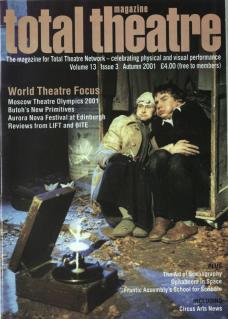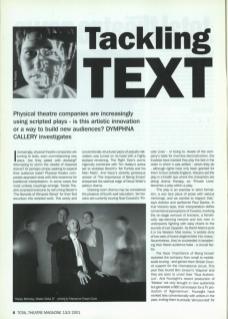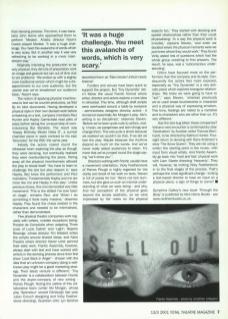Increasingly, physical theatre companies are turning to texts, even commissioning new plays. Are they jaded with devising? Attempting to storm the citadel of classical drama? Or perhaps simply seeking to expand their audience base? Physical theatre companies approach texts with little reverence for traditional interpretation. In some cases the most unlikely couplings emerge. Trestle Theatre surprised everyone by exhuming Besier's The Barretts of Wimpole Street for their first excursion into scripted work. This wordy and conventionally structured piece of pseudo-naturalism was turned on its head with a highly stylised rendering. The Right Size's comic ingenuity combined with Tim Hatley's active set to revitalise Brecht's Mr Puntila and his Man Matti. And Kaos' stylishly grotesque version of The Importance of Being Ernest sharpened the satirical edge of Oscar Wilde's parlour drama.
Drawing-room drama may be considered the preserve of fourth-wall naturalism. Yet Volcano are currently touring Noel Coward's Private Lives – or trying to. Aware of the company's taste for inventive deconstruction, the trustees have insisted they play the text in the order in which it was written – which they do – although rights have only been granted for them to tour outside England. Volcano set the play in a health spa where the characters are doing drama therapy. So Private Lives becomes a play-within-a-play.
‘The play is an exercise in strict formalism, a very taut piece of prose with various mirrorings, and we wanted to respect that,’ says director and performer Paul Davies. In true Volcano style, their interpretation defies conventional perceptions of Coward, involving the on-stage removal of knickers, a frenetically tap-dancing heroine and two men in underpants fighting with easy chairs to the sounds of Led Zeppelin. As David Adams puts it in his Western Mail review, 'a sedate story of two sets of lovers degenerates into chaos’. Nevertheless, they've succeeded in broadening their Welsh audience base – a crucial factor.
The Kaos Importance of Being Ernest rocketed the company from small to middle-scale touring – and gained them British Council support for the international circuit. This year they toured Ben Jonson's Volpone and they are soon to unveil their Titus Andronicus. And Foursight's recent production of Medea not only brought in new audiences but generated a BBC commission for a TV production of Agamemnon. Foursight have worked less conventionally with writers in the past, inviting them to provide 'stimulus text' for their devising process. This time, it was translator John Harris who approached them to perform Medea. Artistic director Naomi Cooke played Medea: 'It was a huge challenge. You meet this avalanche of words which is very scary. But in another way it was very refreshing to be working in a more mainstream way.’
Originally intending the production to be very physical, they did lots of preparatory work on image and gesture but ran out of time due to set problems. ‘We ended up with a slightly more traditional version which might be a disappointment to our core audience, but the upside was we've broadened our audience base,’ Naomi says.
The notion of applying physical inventiveness to text can be counter-productive, as Told By An Idiot discovered. Having developed a physical style in their own devised work before embarking on a text, company members Paul Hunter and Hayley Carmichael read piles of plays before taking the unusual step of commissioning Biyi Bandele. The result was Happy Birthday Mister Deka D, a surreal chamber piece in stark contrast to his epic Oronooko for the RSC the same year.
Initially the actors roared round the rehearsal room exploring the play as though they were devising, but eventually realised they were overburdening the piece. Paring away all the physical inventiveness allowed the play to reveal itself. 'You have to learn to challenge the text but also respect it,' says Hayley. Biyi knew the performers and Paul maintains, 'Fundamentally Hayley and me are more like me and Hayley in this play.’ Unlike previous shows, this one demanded very little movement. ‘This is the stillest I've ever been on stage,' remarks Paul. 'When I do something it feels really massive,' observes Hayley. They found the chaos resided in the characters and needed to be internalised, rather than demonstrated.
Few physical theatre companies work regularly with writers, notable exceptions being Theatre de complicite when adapting Three Lives of Lucie Cabrol and Light; Rejects Revenge, whose director Tim Hibberd writes the scripts around shared ideas; and Kaos Theatre where director Xavier Leret penned their early work. Frantic Assembly, however, always start with text and have worked with writers in the devising process since their first show Look Back in Anger – chosen with the idea that an unknown company doing a well-known play might be a good marketing strategy. Their latest venture is different: Tiny Dynamite is a collaboration between Frantic and the doyen-company of new writing, Paines Plough. Noting the calibre of this collaborative team (writer Abi Morgan, whose play Splendour wowed Edinburgh last year, Julian Crouch designing and Vicky Featherstone directing), Guardian critic Lyn Gardner described them as 'Manchester United meets Arsenal’.
Funders and venues have been quick to support the project. But Tiny Dynamite didn't follow the usual Frantic format where writer, director and actors explore a core idea in rehearsal. This time, although draft scripts were overhauled around a table by everyone – administrator, designer, director, actors – it remained essentially Abi Morgan's play. ‘Abi's writing is so disciplined,' observes Steven. ‘Before we've been quite rude to writers, really. I mean, we paraphrase and skim things and change them. This was quite a shock because we realised we couldn't do that. If we did we lost the play. Maybe because the rhythms depend so much on the words. And we've never really asked audiences to listen. It's more that we've jumped round the stage saying "We'll show you".'
Directors working with Frantic usually have a movement orientation. Vicky Featherstone of Paines Plough is highly regarded for the clarity and detail of her work on texts. Steven is full of praise for her: 'We're not text dummies, but she gave us such an internal understanding of what we were doing – and why. And her perception of the physical goes beyond the simply aesthetic, so we were impressed by her notes on the physical aspects too.' They started with blocking and spatial relationships rather than their usual physicalising: 'In a way the physical work is invisible,' explains Steven, and when we decided where the physical moments were we just knew where they would work. They found Vicky asked lots of questions which had the whole group wrestling to find answers. The result, he says, was a 'subconscious understanding’.
Critics have focused more on the performers than the company and its style. Consequently the actors feel more exposed, especially as Tiny Dynamite is a very delicate piece which explores triangular relationships. 'We knew we were going to have to "act",' says Steven, ‘whereas previously we've used broad brushstrokes in character and a physical way of expressing emotion. This time, feelings are nailed to a narrative and to characters who are other than us. It's very different.’
Has the text-bug bitten these companies? Volcano next encounter a contemporary play: Destination by Austrian writer Thomas Bernhardt, to be directed by Kathryn Hunter. Foursight return to devising with Hans Andersen's story The Snow Queen. They are not using a writer, the starting point is the music, with input from visual artists. And Frantic Assembly go back into 'hard and fast' physical work with Liam Steele directing Heavenly. They will, however, be inviting Vicky Featherstone in to the final stages of the process. That's perhaps the most significant change – inviting a text-based director to have an input on a physical piece: a sign of things to come?
Dymphna Callery's new book Through the Body is published by Nick Hern Books - see www.nickhernbooks.co.uk


